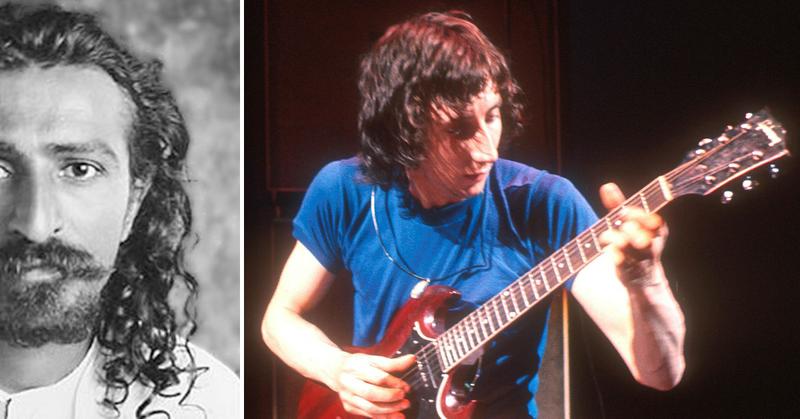Was Woodstock A Teenage Wasteland? The Who's 'Baba O'Riley'
By | May 17, 2019

It's one of the riddles of classic rock: who is 'Baba O'Riley' and what is this "teenage wasteland" we keep hearing about? For Pete Townshend, songwriter of The Who, the oddly-titled song is a meditation on the controversial ending of the '60s, as well as a fragment of Lifehouse, an unfinished rock opera.
For the artist who'd once touted the potential and solidarity of "My Generation," it may be an admission that things hadn't gone so well.
This 1971 single by The Who has transcended its original stadium rock origins and integrated itself into our lives. "Baba O’Riley" can be heard on TV shows and commercials, and whenever you think it’s gone it pops back up. The song seems omnipresent, but there are still people who think it’s called “Teenage Wasteland.” The song has a tricky history, and its backstory is just as twisty as the song’s syncopated backing track.
Don’t Cry, Don’t Raise Your Eye, It’s Only Teenage Wasteland

The phrase “teenage wasteland” has a few different meanings. The entirety of “Baba O’Riley” is a pivot from an earlier work of Townsend’s called Lifehouse, a science fiction rock opera that took place in a dystopian future where rock 'n roll no longer exists. The “teenage wasteland” of the song is describing a group of people in Townsend’s story who are seen as “scum.” He explained:
It's mainly young people who are either farmer's kids whose parents can't afford to buy them experience suits; then there's just scum, like these two geezers who ride around in a battered-up old Cadillac limousine and they play old Who records on the tape deck... I call them Track fans.
The Finished Track Is A Rumination On Post-Woodstock Life

The ‘60s was a decade of experimentation with sex and drugs in an attempt to gain a higher spiritual state. But by 1969 a series of things had happened that proved that in order to attain another state of being people have to do more than hang out. The wave of free love crested at the Woodstock festival in 1969.
Townsend’s lyrics point a finger at their own audience, and the young people who hung out in the muddy fields of upper New York. The guitarist has said that with the lyrics, “Teenage Wasteland, yes! We're all wasted” he’s not celebrating the strung-out teens at the festival, he’s chastising them. Townsend explained that the theme of the track is:
The absolute desolation of teenagers at Woodstock, where audience members were strung out on acid and 20 people had brain damage. The irony was that some listeners took the song to be a teenage celebration.
The Title, “Baba O’Riley,” Is A Shoutout To Townsend’s Gurus

“Baba O’Riley” sounds like a bunch of syllables that someone in The Who just slammed together and wrote at the top of a lyrics page. However, the tile is actually a nod to two men who were very important to Pete Townsend: Meher Baba and Terry Riley.
Meher Baba was an Indian guru who inspired his followers to eschew psychedelic drugs and marijuana along with evangelizing for him. He simply wanted his followers to live a spiritual life. Terry Riley is a composer whose experimental work is based on improvising in various keys and making tape loops of the pieces that he creates.
Townsend took pieces of each man’s philosophy in order to create the backing track of the song. Initially, Townsend wanted to run the vital signs and personality of Meher Baba through a synthesizer, and have the machine interpret the information into sound. That didn’t work out, so instead, he used the marimba setting on a Lowrey Berkshire Deluxe TBO-1 and looped it throughout the track.
The Song Began As A Part Of Townsend’s Lifehouse Project

Following the success of The Who's rock opera Tommy, Townshend wanted to continue raising the stakes of rock 'n roll with another concept album. “Baba O’Riley” was included among the initial tracks for Lifehouse. The song was meant to be sung by a Scottish farmer as he gathers his family so they can go off in search of his teenage daughter.
The project was never finished, and while Townsend was never able to flesh it out in the early ‘70s he’s spoken about the plot at length. He explained the story as being about:
A self-sufficient drop-out family group farming in a remote part of Scotland decide to return South to investigate rumors of a subversive concert event that promises to shake and wake up apathetic, fearful British society. Ray is married to Sally, they hope to link up with their daughter Mary who has run away from home to attend the concert. They travel through the scarred wasteland of middle England in a motor caravan, running an air conditioner they hope will protect them from pollution.
Townsend Believes 'Baba O’Riley' To Be His Crowning Achievement

There’s nothing wrong with enjoying your own work, especially if you’ve written something that’s as magnificent as “Baba O’Riley.” Townsend has said that whenever he plays the song live he reflects on writing the song, and everything it’s taken him.
There is this moment of standing there just listening to this music and looking out to the audience and just thinking, 'I f**king did that. I wrote that.' I just hope that on my deathbed I don't embarrass myself by asking someone, 'Can you pass me my guitar? And will you run the backing tape of 'Baba O'Riley?' I just want to do it one more time.'
